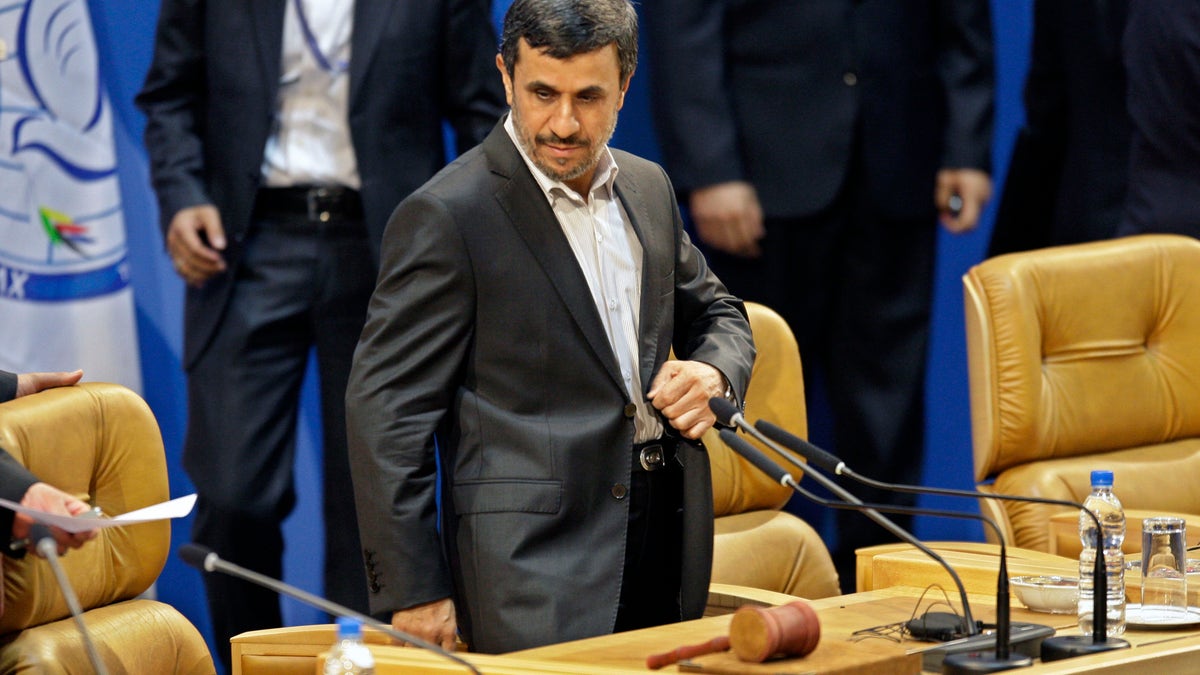
Iranian President Mahmoud Ahmadinejad takes his seat in the afternoon session of the Nonaligned Movement summit, in Tehran, Iran, Thursday, Aug. 30, 2012. (AP Photo/Vahid Salemi) (AP2012)
Iran's supreme leader said Friday that emerging nations have a greater right than the West or United Nations to help resolve Syria's escalating civil war.
The comments appeared to reflect an attempt by Iran to lead a diplomatic push over the crisis in its close ally Syria through the Nonaligned Movement, the grouping of 120 nations whose annual conference Tehran has hosted this week.
Iran has hoped to use the nonaligned summit to head off foreign intervention in the Syrian crisis and also to counter Western efforts to isolate Tehran over its nuclear program. The U.S. and its allies say that Iran is trying to develop nuclear weapons, but Iran denies the claims and says its program is for peaceful purposes.
Tehran has faced an uphill challenge in garnering support for Syrian President Bashar Assad. Some in the organization -- particularly Sunni Muslim majority nations -- are more sympathetic with the rebels, if not outright backing them.
Iranian Supreme Leader Ayatollah Ali Khamenei met Friday with Syria's prime minister, Wael Nader al-Halqi, and Damascus' delegation to the conference.
"The Nonaligned Movement definitely has more political right than the U.S., NATO or some European countries to intervene in the Syrian issue," Khamenei said. He did not elaborate on what kind of role the group should have.
The U.N. and Arab League have both led ultimately failed efforts to negotiate an end to Syria's violence, in which thousands have been killed since early 2011. Turkey this week called for the U.N. to authorization creation of a safe zone in Syria for tens of thousands fleeing their homes. Britain and France have left open the possibility of more aggressive action, including a military-enforced no-fly zone to protect a safe area -- though that still seems a remote possibility.
But the Nonaligned Movement, an organization formed in the Cold War as an alternative to both the Soviet and U.S. blocs, has little cohesiveness or international weight now to push a Syria initiative. And its members are divided over Syria.
On Thursday Egypt's Islamist president Mohammed Morsi -- making the first visit to Iran by an Egyptian leader since the 1979 Islamic Revolution -- said in Tehran that Assad's "oppressive" regime has lost its legitimacy and that the world must stand behind the Syrian rebels.
Syrian delegates to the conference walked out during Morsi's speech.
Syrian Foreign Minister Walid al-Moallem on Friday complained that some nonaligned member states arm the rebels.
"Unfortunately, some regional countries, that are also members of the nonaligned movement, are providing weapons and military training as well as money to the armed groups to destroy Syria's infrastructure," he told Iranian state TV Friday.
Al-Moallem didn't name any country but last month he openly accused regional powerhouses Saudi Arabia, Qatar and Turkey of trying to destroy his country by supporting the rebels.
Iran, Syria's key remaining ally in the Middle East, has provided Assad's government with military and political backing for years, and has kept up its strong support for the regime since the uprising began in March 2011.
However, Tehran has urged Damascus to listen to the Syrian people's "legitimate demands" but has strongly opposed shipment of weapons to the rebels.
"The main culprits in the Syrian issue are those who have paved the way for flooding shipment of arms into Syria as well as financial support for the irresponsible groups," state TV quoted Khamenei as saying Friday. "The Syrian government should remove excuses from the opponents, continue political reforms and expose behind-the-curtain facts for the Arab public opinion."
Iran has already proposed a three-month ceasefire to pave the way for national reconciliation talks between the Syrian government and the opponents.
Anti-regime fighters have dismissed any role for Iran in such a plan. The rebels say it has little hope of succeeding. Also, the United States has rejected Iranian participation in international meetings on the Syrian crisis.
Iranian state television said that the summit's final declaration issued Friday supported its right to the peaceful use of nuclear energy, but it was not immediately clear whether the text backed Iran's claims that its nuclear program is solely for those peaceful purposes, or simply asserted a general right to produce nuclear energy.
Iran has been seeking to win support from the bloc, accounting for nearly two-thirds of U.N. member states, for its nuclear program. Tehran has used the summit to try to show that U.S.-led efforts to isolate it have failed.
The declaration was approved a day after the U.N. nuclear watchdog said Iran has effectively shut down a probe of Parchin military site in southeast Tehran where Iran is suspected of carrying out explosive tests related to a nuclear weapon trigger.








































